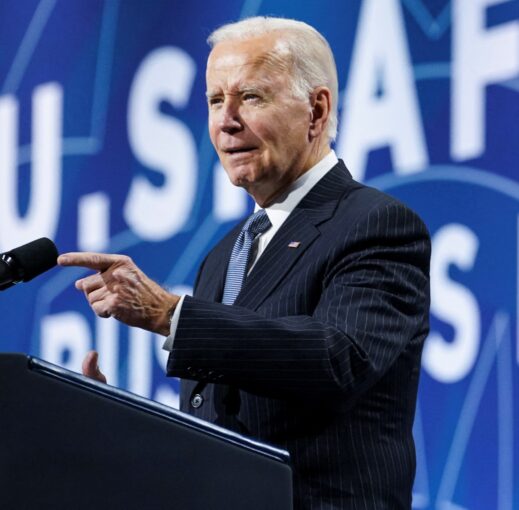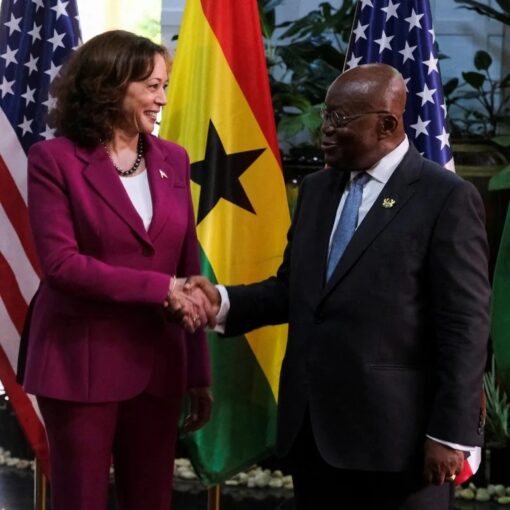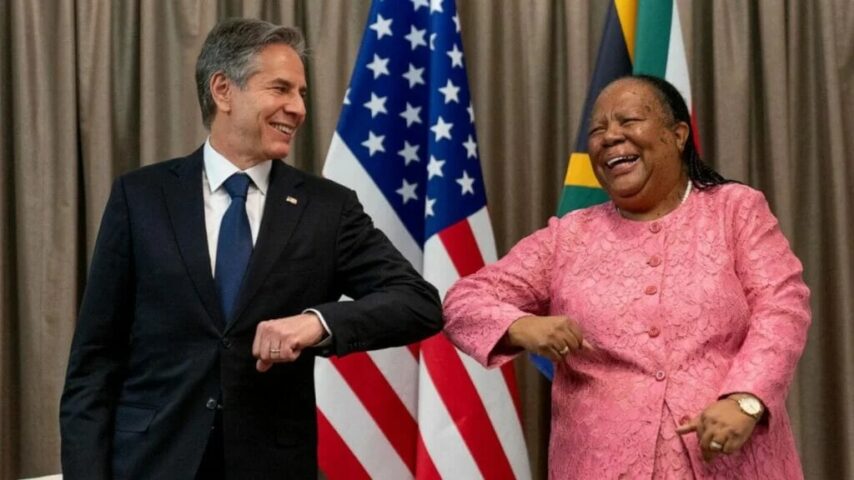Scrutinizing President Joe Biden’s engagement in Africa

BY SOUMANOU SALIFOU
President Joe Biden has ushered in a new era in U.S.-Africa relations, departing sharply from his prejudiced predecessor who will probably be remembered for a long time for his ill-famed expletive about Africa that is not worth mentioning in this magazine. Biden’s Africa policy rose like a comforting ray of sun the morning after a brutal tornado in the Sahel, though in the challenging context of the economic devastations of the Corona virus pandemic, and the world superpower’s heightened fight for influence in the global south.
Setting a new tone
In a message delivered in early February 2022 by video to African leaders meeting virtually in the context of the African Union’s annual summit, President Biden struck a tone that reset the clock for U.S. relations with Africa. In what was his first speech to an international forum as president, Biden stated: “The United States stands ready now to be your partner in solidarity, support, and mutual respect.”
The president began his remarks by stating his belief in multilateralism: “This past year has shown us how interconnected our world is and how our fates are bound up together. That’s why my administration is committing to rebuilding our partnership around the world and re-engaging the international institutions like the African Union.”
Biden then talked about a “shared vision of a better future” by working with Africa: “We must all work together to advance our shared vision of a better future; a future of growing trade and investment that advances prosperity for all our nations; a future that advances lives and peace and security for all our citizens; a future committed to investing in our democratic institutions and promoting the human rights of all people.”
The multiple tracks of President Biden’s envisioned partnership with Africa include investing in global health to defeat “Covid-19 and working to prevent, detect and respond to future health crises, and partnering with the African CDC and other institutions to advance health security.”
Suiting the action to the word
Turning the words into action, the administration immediately announced several initiatives, including a whopping $215 million in new funding to address the pandemic in Africa, focusing on accelerating widespread and equitable access to, and the delivery of safe and effective vaccinations.”
Then, as if to show that he really meant business in his engagement with Africa, President Biden broke the norms established by his predecessors in their Africa policies.
Historically, U.S. presidents have launched their biggest African initiatives only during their second terms. It wasn’t until May 2000, during the last year of his second term, that President Bill Clinton signed into law his landmark initiative, The African Growth and Opportunity Act (AGOA), which opened the U.S. marketplace free of duties for thousands of products from Africa. President George W. Bush did not launch The President’s Emergency Plan for AIDS Relief (PEPFAR), which proved a powerful tool to fight the AIDS epidemic—that primarily plagued Africa—until well into the second year of his second term, in 2005. Arguably President Barack Obama’s most visible legacies to Africa, the unprecedented U.S.-Africa Leaders Summit, came to life way into his second term.
President Biden replicated the historical gathering by bringing 49 African heads of state to Washington before the end of his second year in office, in mid-December 2022. As if that feat was not enough, Mr. Biden announced staggering initiatives during the summit to help jumpstart African economies brought on their knees by the pandemic, fight the devastating effects of climate change on the African continent—the least polluter that is the most affected by climate change. In sum, he announced an investment package for Africa to the tune of $55 billion over the next three years to support the continent in the areas of security, the economy, and health. He strongly advocated for the admission of the African Union into the G20 group, and two seats for Africa on the U.N. Security Council. “Africa must finally participate in international institutions and in discussions on how to address global challenges,” he said, “it is an indispensable partner for the well-being of the whole world,” the president added.
The lingering plan to visit Africa

In the wake of the summit, the 45th president announced his intention to visit Africa. The announcement, welcomed by African leaders and applauded by members of the African American community—including Gregory W. Meeks, a representative from New York and ranking member of the House Committee on Foreign Affairs, who grew impatient when the visit was taking long to happen—is yet to materialize. Unforeseen world crises such as the wars in Ukraine and in Gaza, not to mention the surge in opinion polls in favor of the president’s rival for the 2024 election, apparently pushed the plan to visit Africa down on the president’s agenda.
When Biden hosted Angolan President João Lourenço at the White on November 30, 2023—which reminded observers of U.S. most ambitious project in Africa, the $14 billion Lobito Corridor logistics project which connects Angola, DR Congo and Zambia—the president was asked if he planned to visit Angola, to which he answered, “I have been there, and I will be back.”
Vice President Kamala Harris, she, was there as recently as March 2023, visiting three countries: Ghana, Tanzania, and Zambia. The 9-day tour in three regions of the continent was the reaffirmation of the Biden administration’s commitment to partner with Africa, as the president stated during the Second U.S.-Africa Leaders Summit.

Harris’s visit crowned the visits of several high-level members of the administration—including Treasury Secretary Janet Yellen, U.N. Ambassador Linda Thomas-Greenfield, and even the first lady, Jill Biden, among others. Altogether, they had traveled to more than a dozen African countries. That is not to mention Secretary of State Antony Blinken, a fine diplomat and long-time aide to the president. Living apparently between two flights, the chief U.S. diplomat literarily cris-crosses the continent seemingly all year round. A fluent speaker of Parisian French, he sometimes shows off his linguistic skills by addressing French-speaking African officials in the language they have inherited from decades of French colonization.
Superpowers’ fight for influence in Africa
In a background press call before Vice President Harris’s trip to Africa, a senior administration had said, “The U.S.-Africa Leaders’ Summit made it clear that our relationship with Africa cannot, and should not, and will not, be defined by competition with China. The vice president’s trip will illustrate that we have an affirmative agenda in Africa.” Nonetheless, during the press conference that followed the meeting between the vice president and Zambia’s president, Hakainde Hichilema, on Friday, March 31, 2022, in Lusaka, reporters brought up the perception of the vice president’s visit as a way to rival China’s influence in Africa. Harris quickly dismissed it saying, “We squarely focused on further deepening Zambia-U.S. ties and how we can work together for the mutual benefit of our people.” To put it in non-diplomatic terms, though, there is not a shadow of doubt that U.S. regained interest in Africa is part of the superpowers’ fight for influence in the global south.
The challenge for the US to keep African allies under its tent
President Biden’s overture towards Africa is the version 2.0 of former President Barack Obama’s Africa policy. Some analysts feel that the United States has come too late in the game, pointing to China’s massive presence in Africa and the return on the global stage of Russia, a defunct superpower that virtually faded away after the demise of the Soviet Union.
While there is plenty of game left to be played and the United States can still score big—and even probably win in the long run—the Biden White House and future administrations inclined to pursue the same Africa policy have their work cut out for them.
In these challenging times of economic hardships borne out of the Covid-19 pandemic and compounded by the ripple effects of the war in Ukraine—sharp increase of fuel and food prices—African nations are in dire need of help from anywhere. Not unlike other African leaders, the president of Tanzania, Samia Suluhu Hassan, who hosted Harris during her African tour, was on a state visit to China the previous year and had met with President Xi Jinping. Tanzania was among the 8 African nations that voted against condemning Russia’s aggression in Ukraine. The vice president’s important steps to strengthen the economic ties between the two nations came to the Tanzanian government as a welcomed addition to the assistance from its Chinese partner.
Besides African leaders’ open arms to receive aid from anywhere, most of them are reluctant to side exclusively with one superpower. Others, including U.S. long-time ally South Africa, not only state such sentiment openly, but also develop deep ties with U.S. rivals on the global stage.

South Africa’s president, Cyril Ramaphosa, made a state visit to Washington in September 2022 and was not only hosted by Joe Biden at the White House, walking away with a pledge of substantial aid, but was also treated to breakfast by Vice President Kamala Harris—a rare occurrence for visiting African leaders. In the news conference that followed the audience with President Biden, Ramaphosa, whose country was among the 17 African nations that abstained from the U.N. vote condemning Russia’s invasion of Ukraine, said, in reference to his stance on the invasion, “Our position on this is respected, it is known and recognized. Clearly, the conflict has to be resolved. Our view is that it can best be resolved through dialogue and negotiations.”
Despite Ramaphosa preaching dialogue and negotiations, in June 2023, there were swelling rumors of an alleged shipment of weapons by Pretoria to Moscow in support of the war in Ukraine. The rumors prompted a group of senators and U.S. representatives from both sides of the aisle to formally ask the administration to take punitive measures against the South African government.
Moreover, the rainbow nation dragging Israel before the International Court of Justice in January 2024, accusing the Jewish state of committing a genocide in Gaza, sharply contrasts with the United States all-out support for Israel.
The American exceptionalism
China’s cooperation with African countries is rooted in its so-called policy of non-interference in other countries’ internal affairs. Beijing, a source of significant aid, investment, and loans for African countries, acts regardless of its African partners’ records in terms of democratization, human rights, or corruption. To the contrary, the United States largely ties its cooperation with its African partners to their records in these areas, raising the alarm when African leaders deviate from these U.S. core values. In three years, the Biden administration has called out African leaders a dozen times on occasions that include the following: Beninese president Patrice Talon’s arbitrary imprisonment of political opponents, forcing some of them into exile; Uganda’s Anti-Homosexuality Act which the administration described as “a tragic violation of universal human rights” and moved to adopt a series of sanctions against Lusaka; and slapping three high-level Malian officials with sanctions because of their connection with the Wagner Group, the Russian government-controlled military organization at the forefront of Russia’s exploitation of mineral resources in a number of African countries, supposedly to help keep their leaders in power.
The United States, an ideal
It’s often said, “America is not a country; it’s an ideal.” For centuries, people from all over the world have been flocking to the United States in the pursuit of the American ideals of liberty, justice, equality, and opportunities. Despite all its flaws, U.S. democracy is one of the strongest in the world. The failure of the massive efforts to overturn the legal election of Joe Biden as the 45th president supports that claim. The Biden administration’s commitment during the U.S.-Africa Leaders Summit to partner with African leaders on human rights, democracy, and gender inclusion reflects U.S. fundamental beliefs. One could argue that if all the superpowers shrined the pursuit of these American core values in their partnership agenda with Africa, the people of Africa would receive, in addition to the much-needed material aid, something as important—if not more so.
One may wonder why Biden indiscriminately invited all these African leaders to Washington, knowing that some of them have no respect for such values. Was it desperation to be in the game, realpolitik driven by the urge to reverse U.S. decades of neglect of Africa?

